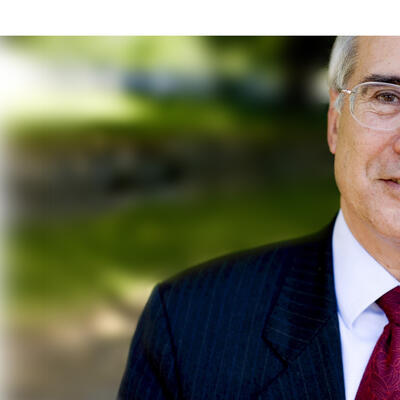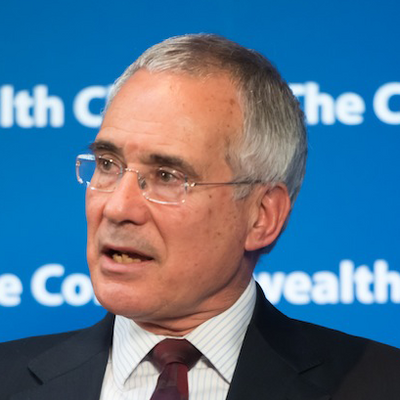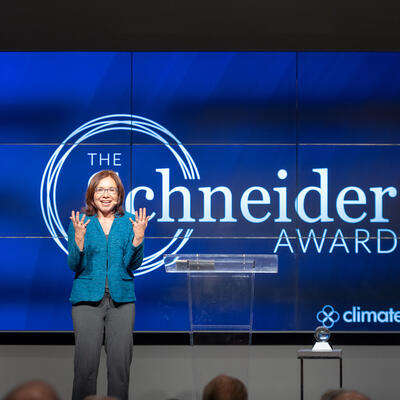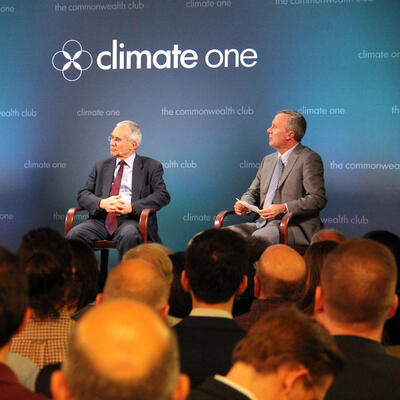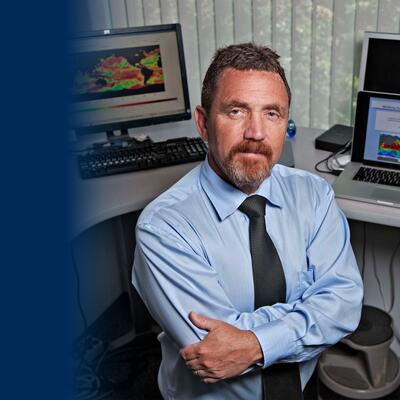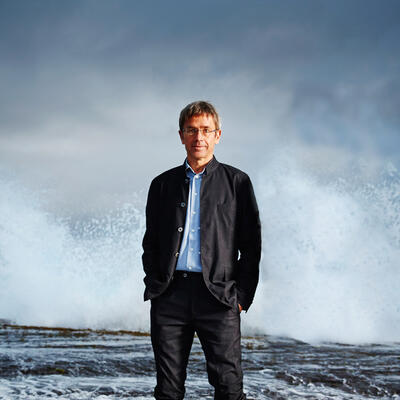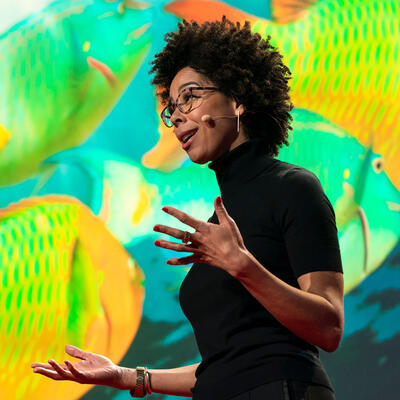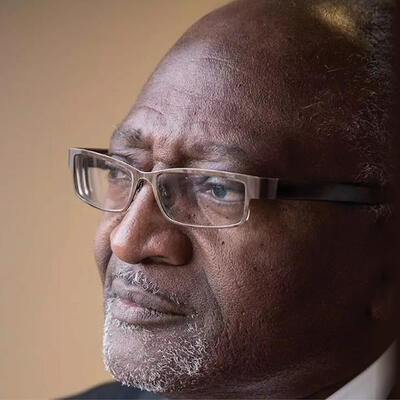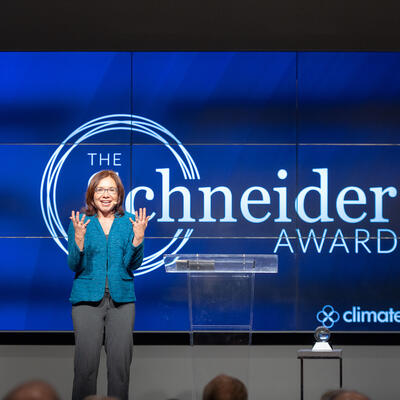Greg Dalton: I'm Greg Dalton. And today on Climate One, we're talking about cleaning up capitalism. Burning fossil fuels is driving severe weather that is hitting economies around the world yet global subsidies of dirty energy hit half a trillion dollars in 2012, half a trillion. Many companies and countries are moving to switch from running on fumes to running on the sun, plants and other clean energy but that transition is not happening fast enough to stabilize the year’s operating system that enables the global economy. Over the next hours we’ll discuss the cost of our addiction to dirty fuels and the rights of poor countries as well as future generations.
During our live audience at the Commonwealth Club in San Francisco, we’re pleased to welcome the distinguished economist,
Nicholas Stern. Lord Stern is Chairman of the Grantham Research Institute on Climate Change and the Environment at the London School of Economics. He's President of the British Academy and a former chief economist of the World Bank. Lord Stern is here today to receive the 2013 Stephen Schneider Award for Outstanding Climate Science Communication presented by Climate One in memory of the late Stanford climatologist, Stephen Schneider. Please welcome Lord Stern to Climate one.
[Applause]
Lord Stern, welcome to Climate One.
Greg Dalton: You're a famous economist. We’re going to talk about the global economy but I first want to ask you a question about my car. I got this 13-year-old car and it's European, not American — not British. Sorry. It runs on gasoline. It's kind of dirty. My family is used to it. I'd like to buy an electric car but the technology is changing. I'd like the price to come down a little bit. What shall I do with my car? Shall I keep running it for a little while or shall I switch to something, a new technology?
Lord Nicholas Stern: Well, since this is NPR you can call Car Talk and get some... [laughter]
Greg Dalton: Yeah. My son loves — exactly. A lot of car-talk in my house, yes.
Lord Nicholas Stern: And I wouldn't anticipate what answer you might get. But those timing questions do what I’m thinking about. I had an old car, which was nearly 20 before it fell apart. And so my question was do I try to — do I buy my Prius now or do I wait a bit and perhaps and it will be a better one. And I did some back of the envelope stuff on what scrapping the car a bit earlier would cost relative to scrapping it a bit later. And those are the kinds of things that are worth doing because technical progress is changing what's possible so rapidly. It may be that you should just wait a little bit, scrap it later on and buy something that's really super efficient. But it depends on how fast you think your car is going to fall apart. And I wouldn't dream of telling you the answer to that question.
Greg Dalton: Well, economists face the same question about how to invest in the cost of doing something today versus a future cost. You wrote a very famous economic report, the Stern Review, but tell U.S. the headline of that, the cost of doing something today versus the cost of doing something in the future and how we ought to look at that.
Lord Nicholas Stern: Well, the headline was that the cost of inaction is much bigger than the cost of action. In other words, the damage we do by waiting in terms of build up of greenhouse gasses is likely to be much bigger than the investment cost that we have to incur now. And to get that kind of answer you have to turn to the science to try to understand what the cost of inaction are going to be.
You have to look at the investments and how much they're going to cost. But even putting aside questions of how rapidly we’re going to learn, even including the great uncertainties in the whole system, that answer, the cost of inaction is much bigger than the cost of action, is pretty robust to any sort of reasonable assumption that you ought to put in.
Greg Dalton: I know that there's half a trillion dollars in subsidies for fossil fuels every year. Do we know how much climate disruption is costing the global economy today?
Lord Nicholas Stern: Actually, the number might be a bit bigger than that because there's a recent study by the IMF published this spring.
Greg Dalton: The fossil fuel subsidy bigger than half a trillion?
Lord Nicholas Stern: Yeah. Those are really explicit ones. If you look at the implicit ones through letting people use their appliances, their cars, their heating without paying for the damage they do, as Steve Schneider said, if you allow people to use the atmosphere as a sewer, essentially you're not changing them for the damage that they're doing you would normally expect to pay for waste water and because it's a cost to manage it, but you're not paying for the carbon dioxide, greenhouse gasses you’re throwing into the atmosphere. And the IMF is quite right. They said, well, that's the subsidy, letting people do something for nothing when that something is damaging, that's correctly counted as a subsidy. There's all the congestion associated when you use your cars and slow other people down by using your cars. So the IMF, quite properly, took a broader view of what constitutes a subsidy, and they came to a much larger figure than that.
So the subsidy essentially direct and through this process of not charging for people causing damage, those subsidies are really very large. Now, the damage that comes is not immediate. The damage comes with lags. But if you look at the damage that is going on, it is much bigger than the kinds of numbers that they're talking about in this case. But what we can say is those kinds of numbers that we've described, half a trillion or a trillion, would lead to a tremendous amount of investment that could erratically reduce the risk.
So I would make those two comparisons. One comparison with the damage that’s being done by the greenhouse gas emissions that that encourages, but also the kind of investment cost that are necessary. And you could do a great deal with a trillion dollars a year. It may be a trillion dollars a year is about the extra investment that we would need. It's a little over 1 percent of world GDP, a trillion dollars. World GDP is 70 or 80 trillion. It's the kind of number, which captures the investment we need. So instead of throwing it in hydrocarbons, if you put it much more sensibly and more measured way into the right kind of investment, that itself would give you the kind of scale of response that you need..
Greg Dalton: So the money is there. It's a matter of reallocating it. About four years ago, the G-20 group of countries in Pittsburg pledged to reduce fossil fuel subsidies. Is that happening at all or is that just talk from heads up of state?
Lord Nicholas Stern: It's happening slowly. In China they're starting to move prices to more reasonable levels. Some are changing for carbon and, in other words, removing the implicit subsidy of letting people pollute for nothing. There are some movement by my guess is that that number has not been radically reduced.
Greg Dalton: As an economist, there's a couple of ways to go. There's to make brown energy more expensive or to make green energy less expensive. Which is the better way?
Lord Nicholas Stern: You got a bit of each. You should certainly charge people for the damage they do. This is about getting markets to work. And the language we use in the Stern Review is that abandoning or having no policy of any serious strength on climate change is essentially to do nothing about the biggest market distortion, the biggest market failure the world has ever seen.
So it's very important to see the role of the market here where if we tax carbon, if we regulate, if we have carbon markets, whatever method we might use or combination of methods we’re using, what we’re doing is trying to make the market work better because if people see the damage that they do and the incentives that they face, they'll make decisions which is much better for the world as a whole. So this is about making markets work well. And you've got to face people with the damage that they do.
I mean, if you’re go and buy a meal you expect to pay for the food, you expect to pay for the space in the restaurant if you're eating out, you expect to pay for the cost that arise because of your action. If you're not paying for the cost that arise because of your action here, the emission of greenhouse gasses, you're going to do too much of that thing, and that's a market failure. So correcting that market failure is fundamental. So you've got to tax the damage or have regulation on the damage that's being done. At the same time, these other technologies are in a very early stage.
If I try out some renewable, if it fails or if it succeeds, other people learn from the investments and actions and I've been taking. So that is a benefit for other people, that kind of discovery. So it's very a powerful economic reasons both for taxing the dirty stuff and for encouraging the newer, more experimental stuff that we’re learning about. And both arguments sound economics based on trying to get market signals right. So this story of — in this case, let's call it — say we do it through the carbon tax on the one side, and encouraging, say, renewables on the other to accelerate that learning process, both those things are market-friendly actions. We need both of them. There are very sound economic reasons for doing both of them.
Greg Dalton: Then why are so many companies against it and they would say it will raise the cost of energy, it will hurt people, it will hurt jobs, it will hurt the economy?
Lord Nicholas Stern: What you're doing is switching over from one kind of activity to another kind of activity. So there are some dislocation in that process. What we've already seen in the United States for example, the jobs in renewables are much bigger than, say, the jobs in coal, much bigger.
So what you got to do is ask, “Are you going to encourage this move or I can encourage that move?” There's going to be change. There's going to be dislocation. But when you try to answer that question, what you got to focus on is what the benefit over the medium term is going to be and what kind of dislocation is going to be over the short term and how you manage it. But we've now happily moved to a point where the kind of jobs you see in renewables are rather bigger than the jobs you see elsewhere. So trying to switch back would actually be more disruptive than keeping going down a path which is going to lead to real returns, real discovery for everybody in the longer therapy.
Greg Dalton: If this is so clearly logical, then why isn't it happening? Is it a failure of the political system?
Lord Nicholas Stern: I think most of the delay, and delay is extremely dangerous in this context, most of the delays are down to absence of political will. And we can see that arising from a number of sources. The recession has diverted attention no matter how many ideas politicians can keep in their head at one time but… [Laughter]
Greg Dalton: Reelection, reelection, reelection. Right, right.
Lord Nicholas Stern: It seems it's limited. If you have a huge crisis that the kind we did have, that is consumed attention and diverted it away from the still bigger medium term problem as a result of climate change. You've got quite an effective creation of doubt and uncertainty from climate deniers. And they run a pretty good campaign, I mean a dishonest and disreputable campaign but they run it quite effectively. You've got opposition from those who have strong vested interests in that area. So these are the kinds of reasons, I think, why we've moved so slowly and why the political will is not nearly as strong as it should be. And of course that turns the spotlight on to the question of how do you stimulate that political will. I get people to tune into this program.
Greg Dalton: And the translation of public opinion that supports some action on climate — public opinion is not translated as a political will. It’s something that's a test of democracy, a failure of political systems. What do you think?
Lord Nicholas Stern: I think it's also — we have to look at ourselves and ask ourselves have we done a good enough job at communicating?
I mean, we need a lot more Steve Schneider to tell the story, tell the story well. We need serious teachings in schools. And I do think that it's improving around the world, the teaching in schools at young people get a chance to look quietly at the message. They're not just seeing it coming at them into the snippets here and there because it does take a little time to think about these issues. But it also needs leadership and it needs a leader who’s going to say, “I've looked ahead. This is of great importance. This is the way we should go.”
So it's a combination of pressure from people who see the issues clearly. And it's our job to help clarity in that analysis. But it needs to come from the top as well. And there’ve been moments, five, six, seven years ago, where it looked as if that leadership was coming on quite strongly but then I think it faded particularly around the story of the recession.
Greg Dalton: One person involved in U.K. government — Owen Paterson is the environment secretary. He plays down climate change and he even called climate scientists irresponsible and immoral. So what's your view of the Cameron government on this issue?
Lord Nicholas Stern: Well, I would invite Mr. Paterson if he's discovered new results in science to overturn 200 years of serious work [laughter]. He should send them immediately to the scientific journals [laughter]. I mean, he's also the gentleman that blamed the badgers removing the goalpost when their attempt to call the badgers didn’t work very well in the U.K.. I'm not sure he's scientific credentials are terribly strong. [Laughter]
Greg Dalton: Who is a climate leader in the U.K. or in Europe right now?
Lord Nicholas Stern: Well, there isn't, I don’t think, outstanding leadership on climate at the overall political level in the big countries. I think it's fair to say that the Northern European, Scandinavian countries have been pretty steady on this issue.
Greg Dalton: Swiss has had carbon tax since the 70’s. They learned a lesson of the first oil.
Lord Nicholas Stern: Of over €100, well over $100, a ton of CO
2. And Denmark, Europe — Denmark, Sweden and Norway have been cutting their emissions. So I would point that to the leadership. But looking forward, what we'd like to see is the Angela Merkel of 2007. She was a real leader in 2007, got the E.U. to move strongly to the targets of cutting by 20 percent Europe’s emissions between 1990 and 2020. She's a nuclear scientist. She understands the arguments.
This coalition that she's now forming with the social democrats, the so called Grand Coalition, the social democrats will be led Sigmar Gabriel. I'm sorry to burden you with European politics here but it is important. He was a former environment minister under the previous Grand Coalition with Angela Merkel at that time. So it's possible that Germany could reinvigorate the leadership. So what we need is the Angela Merkel of 2007.
Greg Dalton: And what about U.S. leadership? John McCain was a leader in 2005. That's changed. President Obama is not as solid as he once was on this issue.
Lord Nicholas Stern: Like many of you, I still remember that speech in Chicago on the night of the first election where I think it was Alice Nixon Cooper who’s 106 or something and she asked a question what if my girls lived as long as she does, what kind of planet are they going to see.
And he spoke of a planet in peril is one of the key issues at the time. It has been a bit disappointing but I think we saw in the Georgetown speech in Georgetown University in June a re-commitment for the second term. So if we have a combination of the Barrack Obama in Grand Town on the night of the election and the Barrack Obama of the Georgetown speech in June this year, if they go on and on, those two Barrack Obamas, then it might start to move. But I'm not an expert on U.S. politics. And I've learned that speaking about U.S. politics in an English accent doesn’t necessarily [laughter] get you very far.
When I'm outside the U.S. trying to get people to understand that actually some things are happening in the US, you speak about California, you speak about New York’s emissions per capita, being half the United States, and Beijing’s emissions per capita being twice those of China, you speak about the few analysis that suggest that about half of the U.S. GDP is generated in cities and states which have reasonable climate policies.
So it seems to me that what you're looking for in terms of changing United States is city states, some farsighted companies or so, and actions that don’t require a lot of legislation in congress. And if you understood the June speech in Georgetown University that was the message that Barrack Obama was offering. There's a great deal that we can do without taking legislation through congress, and that's what we should do.
Greg Dalton: We’re talking about the economics of climate change at Climate One with
Nicholas Stern, economist from the London School of Economics. I'm Greg Dalton. You've written about the waves of innovation, talking about things that don’t require government action, industrial and then steam and then steel and then oil and cars, information technology and clean technology. So put that in perspective for U.S. in terms of what technology can do to drive the kind of change that doesn’t rely on government.
Lord Nicholas Stern: If you look back at the big waves of technological change, some people call them industrial revolutions, but waves of technological change, going back, as you described the mechanization of textiles at the end of the 18th Century and steam and railways, middle of the 19th, electricity and steel at the end of the 19th, going through mass production into the 20th, and of course information, communications technology at the end of the 20th Century, well, who knows if we've even got to the middle of that one, but what you see is two, three, four decades of innovation, investment, discovery, growth. There are some things, which are destroyed along the way. There's dislocation, waves of technological change, industrial revolutions are like that. You leave some of the old stuff behind and you go on to something different. Those are very dynamic period
Now, what we should be looking for is an energy industrial revolutions with clean technologies that looks something like that. But I think the difference — of course, there are many different cities between these different industrial revolutions, but if you look at this one, it does need government policy. If you can get it started, then I think we’ll find that the waves of innovation and discovery will carry it forward with its own momentum. Looking at what's happened to the price of solar PV panels over the last seven or eight years, there’ve been cut by a factor of five divided by five.
And that came about because you had support for these installations of these kinds of technologies, which yielded a very powerful response. So once you get these things going, then it seems to me that the cost reduction can have a very powerful momentum to carry it forward but it does need government policy to get these things going.
Greg Dalton: Well, in the information technology age, the military bought semiconductors, there was government — the U.S. Pentagon largely set the foundation for the Internet so that there's precedent for that. I'd like to ask you about the carbon bubble. There's been a lot of talk recently about assets on the books of fossil fuel companies that their stock price implicitly is built on the expectation that those fuels will be burned and that there'll be revenue coming from that. Tell U.S. about your view as an economist about that nonburnable carbon and possible carbon bubble.
Lord Nicholas Stern: If you take the overall hydrocarbons that are recognized as proven reserves, coal, oil and natural gas, and if you ask the question given those declared reserves, a lot of it, of course, are state owned companies, quite a bit of it are private companies, and you simply ask “Well, take all that and burn it,” what would you get? You get about two or three times, depending on how you do the arithmetic, you get two or three times what we can afford as the overall carbon budget that's left.
Greg Dalton: For a safe level on the climate.
Lord Nicholas Stern: For something like 2 degrees and 50/50 probability.
Greg Dalton: Two degrees being the safe level of warming that states and scientist have said is a do not cross line.
Lord Nicholas Stern: I think it's even a bit strong to call it safe. What the scientist have said is to cross it is dangerous. And I think the difference of that language is important. But if you just say, “Here is the stuff that's declared. If you burn it, you got two or three times what the carbon budget is to be consistent with a roughly 50/50 chance of holding to 2 degrees. That means that either you have to have a very rapid insulation of carbon capture in storage or you have to leave half or so in the ground or we break 2 degrees. It's just a simple logic of simple basic consistency.
So if the world does accelerate as we hope it, many of U.S. hope it will, action to control climate change, it means that there's going to be a capital loss on those things. So I think it's very important to understand that investing in hydrocarbon is a very risky business. And if we’re serious about climate change which I sincerely hope we are and we’ll get more serious, then the more risky that investment to hydro carbon is.
Greg Dalton: You chair an institute founded by a famous money manager, Jeremy Grantham. Does he invest in fossil fuels? Do you invest in fossil fuels?
Lord Nicholas Stern: I confess, I don’t know what Jeremy’s personal portfolio looks like. He manages assets for other people. I don’t actually invest in anything. I have a house [laughter] and I have children and grandchildren but, on a whole, I don’t believe I have any shares. I guess that there are one or two pension funds that I'm involved in and they probably do invest. And, of course, you have to think about what they invest in but that's not something you can control directly.
Greg Dalton: But you say that investing in fossil fuels is a risky proposition. I interviewed the former president of Shell Oil who is here a few weeks ago and said he thought the stock prices of oil companies would be flat to down partially because of this. So if that's going to happen, there's going to be an economic shock to pensioners who have stock in the S&P 500 et cetera because a lot of the market evaluation of our public stock markets isn't in fossil fuels. And so…
Lord Nicholas Stern: Yeah. With industrial revolution, these kinds of things happen. When electricity comes in, those people who made their money on candles are not going to do so well.
Greg Dalton: Buggy whips, during...
Lord Nicholas Stern: Horses and cars and this kind of thing. That's the kind of change that we don’t want to be offhand or cynical and say, “Oh, well, so what?” But we have to recognize that those kinds of changes are necessary, and manage them as best as we can but not changing because some place will be dislocated, is a recipe for disaster.
Greg Dalton: What about the — you've written about green growth and there's a billion people around the world who don’t have access to energy. There's a lot of people who aspire to the western lifestyle that you and I enjoy and everyone listening to this in this room. Is there a right to emit? Is there a carbon — what right do people in poor countries have to grow in the way — have the material wealth that we have?
Lord Nicholas Stern: I don’t think there's any right to emit. I think there's a right to development, a right to find ways of increasing your income. But to emit is to damage. I don’t see that there's a right to damage but there is, it seems to me, a right to develop.
When we articulate rights, we usually derive them from some notion of common humanities, some basic sense in which humans are equal. I mean, that’s after all the way your declaration of independence, your constitution is based. It's trying to articulate a sense in which people are equal as common human beings, what common humanity means. It seems to me that a right to seek ways to better yourself or right to development would be something which we could sit down and discuss and we'd want to articulate that. I think I would, anyway, as a right. But that's not the same as right to emit. And we have to try to do is to break the relationship between consumption and production on the one hand and emissions on the other. Unless we do that, we’re in deep trouble.
I mean, if we stop right here at 50 billion tons per annum of C02 equivalent as world emissions, that’s way above the level that's consistent with holding to 2 degrees with a 50/50 chance. You couldn't just stop. That wouldn't be anywhere near enough. You've got to bring that 50 billion tons of CO2 equivalent a year that we’re emitting to the world, down to well bellow 20 about 40 years from now. So that tells U.S. very clearly, you have to break the relationship between consumption and production on the one hand and emissions on the other. If we do that and we can see how to do it, then we can see how through energy efficiency, through renewables, many ways to stopping deforestation, regrading degraded forests, the whole rafter things that we can see which do help U.S. break that relationship between consumption and production and emissions, if we do that then we found a root to raising living standards around the world and particularly in the poorest parts of the world.
And that seems to me like a duty as people in rich countries to help that process take place. You can't tell people “I'm sorry, fellows. Before we realized the problem, we filled the atmosphere up. It's all too late. You got to stop right there.” There's no way that we should say that. There's no way that will be equitable or decent. But we can do is offer something much better, and it's to work and with the developing countries of the world because they'll discover lots of these things too, find way to doing things differently.
Greg Dalton: Does that mean at rich companies have a responsibility to write checks to send money to poor countries, to acquire clean technologies to develop a cleaner way than the fossil fueled industrial revolution that we've benefited from?
Lord Nicholas Stern: There's a whole range of things that we in rich countries do. We should reduce our own emissions, and in so doing, we’ll discover ways, which other people can look at and share. We should invest in R&D that's going to help that process. And I think are obligated to help finance change in other parts of the world, which are poorer than we are. But you can do that in various ways. You can do that at government level. You can do that individual philanthropic level. But the helping of change in the developing world does seem to me to be fundamental and that is a big part of the story.
But the good news is that there are lots of options out there. Let me just give you one example. There's a community called Selco in Bangalore, in Karnataka in South India. Now, this is a major state, population of 50-60 million people or more. And this company brings micro-finance and small scale solar PV and helps people to buy that solar PV and provides the micro-finance that can help them run a store, that can give light for the kids to work at night and study.
It can be a major transformation in people’s lives. And that's example of the way in which good micro-finance. And in this case, solar PV, can help transform and give people access to electricity when you got a few hundred million people in India with no access to electricity at all. So these are the kinds of ways in which you can help the whole process of moving out of poverty through ways, which don’t destroy the environment.
Greg Dalton: Many countries went straight to cell phones. Some countries could leap frog over fossil fuels and go to cleaner technology. When Nelson Mandela passed away there were some connections between, at one point, South Africa, the situation for majority rule looked hopeless and he yet he persevered and some very positive things happened. I'd like to have your thoughts on the passing of Mandela and any inspiration or lessons you took from him and what happened in South Africa and what broader community faces in terms of moving from fossil fuels, which seems so difficult, it seems impossible.
Lord Nicholas Stern: It was a very moving thing for me. I mean, my generation in the U.K., the Anti-Apartheid Movement, it was absolutely essential to our political activity. It was the first, for many of us, the first kind of political act that we made in the 1960’s to join the demonstrations against apartheid.
Greg Dalton: President Obama said the same thing, it was his first political act.
Lord Nicholas Stern: Yeah. I'm a day older than him [laughter]. I was in Wembley Stadium in London to celebrate the 70th birthday. And then a few years later, there was another celebration at Wembley Stadium but this time Nelson Mandela is there.
I met him personally three times. Once when I was chief economist of the World Bank. And the aura and dignity that — also personal humanity — this is quite extraordinary. The most extraordinary person I've ever met, and I've met him a couple of times after that. So it was a very moving few days for many of U.S. and for many people who knew him far better than I ever did. The example of a common dignity — I mean, he could see the common humanity and the common dignity and the people who are pressing him and his people. He could see how, if we change our behavior, we can make an enormous difference. He showed how to do that through very clear analytical thought. Extraordinarily intelligent man and very strong personal example.
So this is the kind of common humanity, serious analysis, ability to collaborate, personal example, these are the kinds of leadership that we need on this issue. So I think it's a very significant example for all the reasons I described.
Greg Dalton: And he forgave his jailers. And I think he invited one of his jailers or police officers to his inauguration. There was forgiveness there. Some people in their own movement want to villainies fossil fuel executives. Is that the right path?
Lord Nicholas Stern: No. What we have to do is to change the incentives in society, change our value, change our taxes.
There are quite a lot of people in oil companies who take this issue very, very seriously indeed. Some of the big oil companies use the internal price of carbon of $30 or $40 a ton of Co2. It's a question of how we manage the change. And if we get the priorities right in society, I think the energy companies would follow through on the right kind of incentives. But what you've got to do is not only get those incentives right, but keep incredible. And what we've seen around the world that's been very damaging is instability, changing of mind. You get a subsidy one day, you take it away the next. You have a carbon price in Europe appeared for a while and then suddenly you let it crash down.
That kind of policy instability means you don’t get investment, really, to the right kind of levels of any kind. And one of the consequences of that is you see capacity start to get very near to margins in Europe where you risk blackouts and so on. So I don’t think you have to see people who run this company or that company as a villain. I think what you have to do is to bring coalitions together to get the right kind of policy to fix these market failures as we discussed earlier on. And then the investment processes will flow. What I do think is a villainous is to secretly find dishonest treatments of science. That's a different kind of question.
Greg Dalton: And to personally attack scientists — a lot of scientists, we have some in the room here, who suffer personal attacks. Would you put that — how would you look at that?
Lord Nicholas Stern: It's unacceptable. And that is the kind of behavior, which I think we should expect to get some kind of protection from.
But it's very hard to design protection from that kind of abuse and death threats and so on. It's usually done surreptitiously, anonymously, and it's very difficult unsigned on the blogosphere. It's very difficult to give people that kind of protection, the kind of protection that you would think would be reasonable. If identifiable people physically threatened you, you'd expect the law to take its course. If a whole load of unidentifiable people threaten you, it's very hard to do that. So most scientists and some social scientists have to just carry on and keep going. And I salute those who do that. And there are some of those people in the room that's shown enormous personal integrity, strength of character, and they just keep going. Of course, Steve Schneider was one of those.
Greg Dalton: Our guest today at Climate One is
Nicholas Stern, former Chief Economist of the World Bank. I'm Greg Dalton. This is Climate One. There's often an elephant in the room population. A lot of environmentalists don’t like to talk about population. It's not our issue. But the reality is that consumption, the global economy is largely a factor of how many people are burning fossil fuels, eating food, et cetera. So what’s your view on population and can anything be done about 9 billion people on the earth by 2050?
Lord Nicholas Stern: Well, you have to look at the basics of why populations grow. And one fundamental reason is that people are living longer because various diseases have been eradicated. Many people are able to have more food and cleaner water.
So I'm assuming that if we’re discussing population policy, we are not discussing increasing death rates. Free cigarettes to over 50’s or something would be a policy [laughter]. So let's put increasing death rates to one side, at least I will, and put increasing death rates to — it then comes down to birth rates. And what causes reductions in birth rates? We’re seeing quite extraordinary reductions in fertility over the last 35 years or so. If you look at Bangladesh, completed family size, number of children per woman has gown down from numbers like 5.5 or 6 down to numbers like 2.5. It's amazing. In about 35 years.
Why? Well, we, more or less, understand the main reasons for that. Education of girls and women, more opportunities in the labor force for girls. Well, you hope for women. The girls are at school. Property rights, which allow different kinds of security, lowering infant mortality rates, as low as birth rate, and of course access to reproductive healthcare. Those are the five or six factors that, as far as we can understand and I think the evidence is quite strong, account for these dramatic reductions in birth rate. So around quite similar figures to Bangladesh but you see that around the world. It's dropping in India too. Dropping a bit less slowly in Africa. Now, those things, reducing the infant mortality rates, offering education to girls and women, access to reproductive healthcare, this seem to me to be things which have very powerful arguments in their favor already.
These are basic rights, particularly of women and girls. And we should be pushing those things still more strongly for all those reasons. And climate change adds a bit to that. But I think the more — in this case, the arguments on basic human rights where women and girls are so powerful, that that's where we should be concentrating. The reason then that we’re going to see this rise from about 7 billion now to 9 billion plus maybe in 2050 are partly because we see the life expectancy to carry on, increasing, and partly because you got a lot of women in child-bearing age, and that's a follow on from the way in which the demographics have developed. So basically I would intensify because there are good things anyway, action on all those dimensions that I've described. But I think you would want to argue that even if you've never heard of climate change.
Greg Dalton: Before we go to audience questions, I want to ask you about economic growth. There's a school of thought, which holds that — well, they started the Club of Rome in the 70’s. They had to put forward some thoughts about the constraint or the limits to growth. And some people think that because of the financial debt that's accumulated as well as the carbon debt and resource constraints that will put limits in the future on economic growth which solved lots of political and social problems in the past. What's your view on the future of growth. Will it be as robust as it has been in the past?
Lord Nicholas Stern: Probably not but I think if we’re looking at the next 30 or 40 years, you're not going to deal with the issues of climate change and cutting emissions largely through stopping growth.
You've got to break the link between consumption and production on the one hand and emissions in the other because even if — I'm going back to an answer I gave earlier. Even if you stopped growth right here, right now, which you couldn't do anyway but even if you did, at 50 billion tons of CO2 equivalent per annum, we’re 2.5 times where we need to be four decades from now. So once we move fast on cutting, at breaking that relationship between consumption, production and emissions, then it seems to me there is the opportunity as there should be for people in developing countries to raise their living standards.
Already something like 2/3 of the world’s investment is in emerging and developing markets. So it's greening that process that seems to me to be of fundamental importance. And I think that they're trying to stop growth would be political impossible, it would undermine support for cleaner and greener policies. And if you look at living standards in the developing world, it would be unethical.
Greg Dalton: And just to clarify, the thesis is not that government should try to eliminate growth. It's that growth will be limited by factors including resource over-expansion. It's not that we will try to do it — that it will happen because of forces in…
Lord Nicholas Stern: There'll be some slowing down in growth because we've gone through a particular rapid period with recovery after the Second World War in the rich countries, and then a period in China that dates from Deng Xiaoping’s more liberal policies in the end of the 70’s, beginning of the 80’s, they're running as it were their course. The process of catch up is not finished but as you get nearer, it's less powerful.
So I think there are reasons to think — and you got population in some countries too. So I think there are reasons to think that growth rates will slow down but you keep coming back to the fundamental question. Is breaking that link between consumption and production on the one hand and emissions on the other? That's the key story.
Greg Dalton: We’re talking about the global economy with
Nicholas Stern, former chief economist of the World Bank and a professor at the London School of Economics. Let's have our audience question. Welcome to Climate One.
Warren Karlenzig: Thank you very much for a great show. I'm Warren Karlenzig. And I want to ask Professor Stern when he foresaw a global price on carbon being set and what sort of indicators can we look at over the next few years that will indicate we’re heading in that direction besides just political will of leaders like Governor Brown who’s standing there? What are we looking for to get to that model?
Lord Nicholas Stern: Good examples: You got seven properties in China, which are experimenting, with carbon markets. You got the example of California and you got the northeast states. I hope that the European carbon market will be resuscitated. It was absurd that we let it collapse. And the basic reason — you don’t have to be a professor at the LSC to work out that if you give out too many permits, the price is going to crash. And when we had the recession and slow down in Europe that would have been the moment to reduce the number of permits. They didn’t do that and the price of carbon collapsed. So to understand why that happened, as I said, you don’t have to be very clever to work that out. So I think this is going to move forward with examples.
And I'm quite happy with the carbon tax. And if you ask me to choose between a carbon tax and a carbon market, I'd probably go for the carbon tax but I wouldn't get over excited about it. Whichever seems to work best in the environment that you're in. So I think we shouldn't give up hope. Actually we have an increasing number of examples. What we need is political determination to make them work well. And I think you're going to find that in California, I believe.
Greg Dalton: Let's have our next audience question for
Nicholas Stern.
Female Participant 1: You talked about lack of political will. And we know that those facts on science and climate science are here. So if the facts of climate science won't change political will, what will? And if not political will, then who’s the most important party’s mind to change?
Lord Nicholas Stern: I think you got to do two things. It's crucial that people understand the risks. The risks, as we know, are colossal. These are existential risks for big parts of the world’s population.
We’re the first generation, which through our negligence, could devastate the relationship between human beings and the planet. And we have to understand the consequences, the potential consequences of two, four, five degrees centigrade. And we look to the scientists to help U.S. do that and working with them, and social scientist as well. So the first part of the story is making it clear that those risks are enormous but that's not sufficient. The second part of the story is to be able to show that there are ways of changing that are actually very attractive. If you look at energy efficiency, if you look at renewables, alternative ways of doing things, if you look at stopping deforestation, what you'll see is a world that looks, in terms of its consumption and production, cleaner, quieter, safer, more bio-diverse, and actually more community oriented because a lot of the things that we need to do, we’re doing in a community.
You can't reuse and recycle other than in a community. So a powerful description of what is the alternative way of doing things looks like — and as we do that, I think we’ll see that it's much more attractive than the old way of doing things. So you have to put those two things together. The second part of the story needs strong examples. And I think you're starting to get, in some cities, some sectors, examples of how that could work. But as I said, it needs courageous political leadership, it needs good teaching in schools, bring on the next generation. We can't give out, we can't just say, “Oh, this political will stuff is all too difficult. It's not going to happen.” Well, if that's what you really believe, then get a hat and write a letter of apology to your grand children. [Laughter]
Greg Dalton: Nelson Mandela showed that impossible things can happen. Let's have our next question for
Nicholas Stern at Climate One.
Peter Joseph: Yes. Thank you so much, sir, for coming all this way to speak with us. I'm Peter Joseph with Citizens Climate Lobby, trying to get a revenue-neutral carbon tax through the United States Congress. Good luck. Many times we — what I really want to know is what's going to happen with Downtown Abbey [laughter] and their financial situation. But more to the point…
Lord Nicholas Stern: I've got bored with Downtown Abbey [laughter]. I did watch it for a bit.
Peter Joseph: Many people say if we have a carbon tax in this country it will disadvantage American industry because no one seems to understand the boarder tax adjustment. Could you educate U.S. on how that might work? How if the U.S. showed leadership, other countries might follow?
Lord Nicholas Stern: The first thing to understand is that for the vast majority of economic activity, the energy costs are modest.
Basic energy would be equivalent to about 5 percent of GDP. If you put that up, say, by 20 percent for a while once you learn about these alternative technologies, that's a one of 1 percent, one of 1 percent kick upwards in your cost. That doesn’t lead people to move on scale. We looked in the Stern Review, other people looked at it, environment migration of industry is very limited if you look in the data. Why? Because there are other things that are much bigger. Labor cost, labor productivity, exchange rates, those are much bigger, the investment climate, how difficult it is to do business and so on. Those are the big things that determine where people locate. So it's really only if it's just three or four industries, that the price of energy story is really significant.
So the first thing to do is to really look at those competitiveness questions carefully. And when you do, you'll see that those arguments are really associated with a very narrow range of industries. And I think it would be quite wrong to let that tail wag the overall dog. So be more analytical, be more empirical. Most of the stuff about competitiveness is slogans without analysis and without detailed cost calculations. There will be some places like steel and aluminum and petrochemicals and paper. It's really — there are four or so and they're not really parts of the economy. Now, I don’t want to say forget them but it's much better to manage change in those areas rather than let the difficulty of changing those areas block progress on something as important as this.
I do think that some time down the track for countries or groups of countries to say that if you try to export stuff to U.S. that's based on dirty production, then we have the right to take that into account at the border. We do that with environment. We do do that with child labor and so on. Those are the kinds of things, which is perfectly acceptable under the WTO. But I wouldn't want to rush that. It would be very good if countries that are moving strongly said that, look, there's a group of U.S. that are moving strongly. We have to say that 10 or 15 down the track, if other people don’t join us, if they insist on dirty methods of production, then they are subsidizing pollution by not charging for it. And we have to take that into account in the border adjustment. I spent most of my life as an economist fighting for protectionism. It's actually isn't protectionism. It's correcting for the mispricing elsewhere.
Greg Dalton: We have a few minutes left. Let's have our next question. Welcome to Climate One.
Lisa Hoyos: Hi. Thank you for being here. My name is Lisa Hoyos and I run an organization called Climate Parents. We’re trying to mobilize parents as a strong political constituency for climate solutions. My question gets to what you've been saying about Nelson Mandela and the issue you raised regarding vengeance as it relates to fossil fuel executives versus another way to look at it which is accountability because these same characters, if you will, are funding fleets, legions of lobbyists who I've encountered when we’re — it's a David and Goliath sort of reality when you're a climate advocate, clean air advocate versus a huge labyrinth of fossil fuel lobbyist powerful. So in California we have AB-32, which the Government will hopefully talk, about, our landmark climate policy, the only state that has it to scale in the US. Constantly, oil lobbyist are going after it.
They try to restrain it, push it back, stop key pieces. So I was wondering if you revisited your question about how to deal with oil executives and fossil fuel executives. What's an accountability strategy that you think works because at the end of the day they have so much money and we have political will and organizing but it's hard?
Greg Dalton: Thank you.
Lord Nicholas Stern: You have to get the incentives in society right. People react to the prices that they see. So given the incentive structures, if people react to them in legal ways, I don’t think that you can make them villains. If they put money behind the spreading of lies about science, that seems to me to be a different kind of question and a different kind of accountability. But it's very difficult, and in some cases, dangerous to try to get too heavy and legal about that kind of thing.
But how you distinguish between somebody who is putting money behind the case that they really believe in and somebody who’s being genuinely dishonest? Now, some of the time we think we can but it's very hard to imagine a system, which you'd find acceptable in terms of freedom that would easily distinguish between the funding of different kind of cases.
Now, the question of lobbying is something for political systems to try to deal with. It is a big issue now in the U.K. is how far and how much do we allow it to be spent on lobbying. And I don’t think there's an indefinite right to spend indefinite amount of sums to try to persuade just a few people to vote this way or that way. But articulating into a legal process is very hard.
And I don’t want to tell another country I find it hard to work out how we should do it in my own country. So I think we have to be a bit careful about the way in which we treat people and the way in which we treat the legality of this. I think it's much better to actually win the argument and win the argument and create the political will by the quality of the arguments that you bring to the table. So I've not given up on democracy. I think we've got a good case and we make it well. Then we have a good chance. And that's where I would focus my energies. But I would deeply disapprove and I think we ought to expose those who put money behind telling lies.
Greg Dalton: We have time for one or two more brief questions and brief answers. Welcome to Climate One.
John Mashey: This one is pretty brief. My name is John Mashey. I have a U.K.-US political comparison question. In the U.S. we have plenty of think tanks, which are public charities tax exempt. A whole lot of them are near K Street in Washington and we got, actually, a lot of economists I’m afraid that actually have a fair amount of influence, apparently, on the political process. The only one I know of like that in the U.K. is Lord Lawson’s Global Warming Policy Foundation. Do they actually have any influence over there or is that not anything?
Lord Nicholas Stern: Yeah. Unfortunately they do. Unfortunately they do and they don’t disclose where they get their funding from. They have a right to speak. Their arguments are pretty poor. And it's not too hard to show where they're wrong. And that's where we should focus our energies.
Greg Dalton: Next question. Welcome to Climate One.
Female Participant 2: I have a very difficult question for you. It seems that in order to incentivize businesses to change their way, maybe we have to show them how difficult it will be if we had a world with 4 degree Celsius.
The World Bank is concerned about a 4 degree Celsius world. Kevin Anderson is concerned about it. I've read Mark Lyna’s book, Six Degrees, which is devastating to read. But if you look at the kinds of physical changes that will happen with the 4 degrees Celsius world, can you give U.S. an economic consequences to that so that that might incentivize people to understand just how disastrous that would be?
Lord Nicholas Stern: Well, there are a number of U.S. who tried to articulate what that might look like. Some of the calculations in the Stern Review were exactly on that point. By the way, most of the economic models understate the kind of damages that you would see at 4-5-6 degrees. Four or five degrees is the difference between where we are now and the last ice age. Ice sheets came down — and forgive this version of latitude. The ice sheets came down to London and people lived closer to the equator than that. That's telling U.S. surely that changes of that magnitude are likely to involve massive movements of people. And massive movements of people are likely to involve severe and extended conflict. And you can't have a peace treaty in this case. You can't just turn it off.
So I think we have to get much better describing the kind of consequences at 4 or 5-6 degrees. But I think, actually, changing behavior will come through an understanding of what's responsible, and it will come through the kind of incentive structures that would be set up by a policy that really had understood not only the magnitude of the risks but also the attractiveness of different ways of doing things. I think just by describing the risks alone, you'll get some change in behavior but I don’t think it would be big enough to generate the kind of change that we need, even the policies as well.
But understanding of the risks can help generate the policies we have argued earlier. With that, you have to be able to describe and give examples on the very big changes that are necessary and why they look attractive. Discovery, innovation, cleaner, quieter, safer, more community-oriented, more bio diverse and so on. So making that case is absolutely fundamental to getting change.
Greg Dalton: Nicholas Stern, we’re at the end here. But before we close I want to ask you, because you've been doing this work for a long time, putting work on the cost of fossil fuels, et cetera. Often that's an obstruction for future generations. I'd like you to tell U.S. briefly —you're a grandfather now. You have two young grandchildren.
Greg Dalton: Three?
Greg Dalton: Congratulations. How they're presence motivates you and makes it real for you, this talk about future generation?
Lord Nicholas Stern: If you're talking about the conditions of life for people 50-100 years from now, that's not some abstract future generation. You can look them in the eye and their life should have at least equal weight with yours. And that should be reflected in the action, in your actions. I can't see any ethical reason for distinguishing between people’s rights as individuals, the value of their lives, simply to do with the date of birth. And that, I think, is underlined very strongly to you when you look into your grandchildren’s eyes.
Greg Dalton: We have to end it there. Our thanks to
Nicholas Stern, former World Bank chief economist, chair of the Grantham Research Institute on Climate Change and Environmental at London School of Economics and winner of the 2013 Stephen Schneider Award here at Climate One. I'd like to thank you for coming, sir. And also thank you audience here and on the radio. I'm Greg Dalton. And this is a meeting of Climate One at the Commonwealth Club is now over.
[Applause]
Please stay seated. We are going to do a couple of things. First, I'd like to invite a member of the Schneider Award, Larry Goulder, to come up and introduce him briefly. And so, Larry.
Larry Goulder: Thanks, Greg. The last book that Steve Schneider wrote was Science as a Contact Sport. And it talked about the various challenges that scientists face, indeed the battles they often faced when they went public and tried to convey their new ideas to the more general public. And most of the book was about the role of climate scientist, not just climate scientist but there scientists as well. But in the last chapter of his book he asked the question what can the general public do to try to bring about a better world. What he emphasized in that chapter was the importance of teaching the next generation, moving on and conveying to the next generation what this generation has learned.
And he included in the chapter — at the end of the chapter the book ends with the words to a song written by Graham Nash called “Teach Your Children”. Now, it turns out we have absolute proof that Nick is a fan of Crosby, Stills and Nash. And it would have been nice to bring Graham Nash here to sing the song directly to Nick. I think that would have been a fitting way to finish this evening. But we weren’t able to do that but Greg in his wisdom, when Graham Nash was here a few weeks ago giving a concert, he cornered Graham and said, “We'd really like to regale you and to somehow get you involved.
And so through Greg’s work, they created a video, which you're going to see which involves “Teach Your Children”. As you'll see, it's a little different from the usual performance by Graham Nash. So here's the video.
Greg Dalton: You often end your concert with one of your famous songs, “Teach Your Children”. And now that you're a grandfather we thought we would mix it up tonight and begin with a gift for you.
Graham Nash: Oh. Oh, look at this. [Laughter]
[Applause]
I can't wait to see what's going to go on here [laughter]. Guitars too.
Children Singing:
You who are on the road must have a code that you can live by
And so become yourself because the past is just a goodbye
Teach your children well
Their father's hell will slowly go by
And feed them on your dreams
The one they picks, the one you'll know by
Don't you ever ask them why
If they told you, you will cry
So just look at them and sigh
And know they love you
And you, of tender years, can't know the fears that your elders grew by
And so please help them with your youth
They seek the truth before they can die
Teach your parents well
Their children's hell will slowly go by
And feed them on your dreams
The one they picks, the one you'll know by.
Don't you ever ask them why
If they told you, you would cry
So just look at them and sigh
And know they love you
Graham Nash: Very good.
[Applause]
Greg Dalton: Well, Lord Stern, on the day that the jury selected you as the winner of the Stephen Schneider Award for 2013 I met Graham Nash in New York and I told him who the winner was and he recognized immediately. “Oh, yes. He's very impressive.”
So he couldn't be here tonight but he did sign this book for you. This is his memoir and he wrote it to you. It's his tale of sex and drugs and rock and roll [laughter]. But there are lots of good reading. It’ll lift you up.
[Applause]
Greg Dalton: I've had the honor of interviewing many governors, senators, cabinet secretaries, et cetera, on this stage. Only one has ever come here and sat in the back of class and learned and listened. It's my honor to introduce Governor Brown to present the award.
[Applause]
Governor Brown: Well, I have a little award here. I think this is the globe itself but it's to you,
Nicholas Stern, the 2013 Stephen Schneider Award for climate and science communication. There's a lot of science but there's not a lot of good communication. We heard some of that tonight. So please keep it going. Congratulations.
[Applause]
Governor Brown: And I'd like to say this is the place to get this award because wherever you look around the world, California is a place of surprise and change and invention. And while this whole climate debate and turbulence has a lot of different forces and ideas, wherever I look, I see in this state, through many, many years, there are people pushing ahead whether it's AB-32 or it's the energy efficiency standards or the renewable energy portfolio or all the various things that we’re doing.
We got a lot way to go. There's a lot of different views but California has always been a dream standing out there. And I would hope that this award, with this great economist coming with a fine king’s English [laughter] can inspire U.S. to not be push back by the barriers and the propaganda and the inertia, but take some renewed energy that this is the state of the gold rush, Google and Twitter and all the other stuff, good and bad, that makes for waves and change. And tonight, we’re going to live up to this award and make California push all the more further and bring other states and other countries along with your ideas.
[Applause]
Greg Dalton: Thank you, Governor. We also have — I believe there's one or two previous winners. I'd like to ask Dr. Jim Hansen and Dr. Alley, two previous winners of the Stephen Schneider Award. Come on up here. Pose with the Governor. Two other — come on up. Come on up.
[Applause]
[END]
